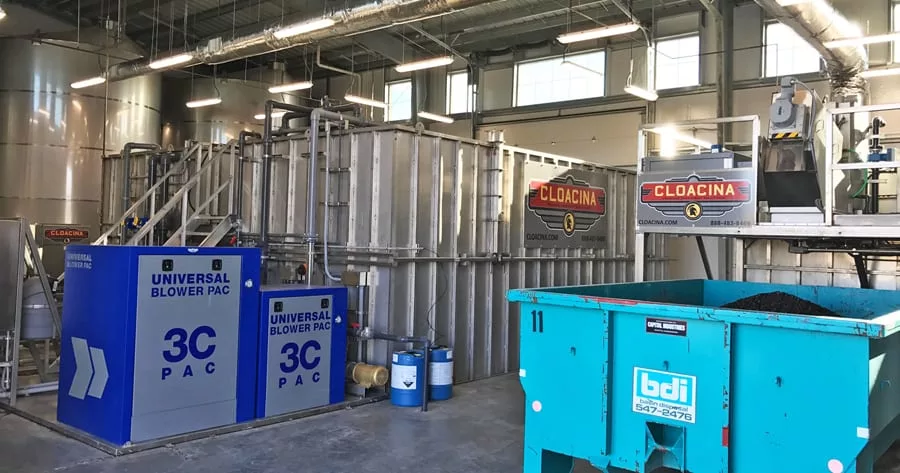
Home » Cities build wine waste treatment plants to lure wineries
Cities build wine waste treatment plants to lure wineries

February 14, 2017
By Sean Bassinger
Even the sweetest wine has waste.
That’s why two Eastern Washington cities have invested in special wastewater treatment facilities to handle wine effluent.
It’s not a glamorous piece of the wine industry, but it’s a critical part of a continued multimillion-dollar effort to draw more wineries to the Tri-City area.
The $3.2 million West Richland industrial wastewater treatment plant, known as the I-Plant, opened before last year’s first crush. It treats all the effluent before any remaining waste gets processed through West Richland’s sewer system.
It’s an expensive business and relieves wineries of building their own expensive on-site pretreatment facilities without taxing the municipal wastewater treatment plants.
Kennewick’s smaller wine wastewater treatment facility at the Columbia Gardens Wine Village won’t be as visible as West Richland’s. The city will have a room for the controls and to monitor the effluent wastewater process, but the tank itself will be underground.
The city of Kennewick is working on the installation as well as street improvements that include sidewalks, lights and additional work on the scenic nature trail by Duffy’s Pond near Columbia Gardens.
“The city’s commitment was to do that so we could attract wineries to that area,” said Evelyn Lusignan, public relations and government affairs director for Kennewick. “We were initially looking at full on-site treatment.”
But the city and Port of Kennewick, which is developing the wine village, decided it would be much cheaper and efficient to just account for the first wineries coming in.
“It’ll be significantly less than the $800,000 that we initially budgeted,” Lusignan said.
So far, they’ve spent about $200,000 for the engineering and all the work to date.
Kennewick and West Richland’s efforts to lure wineries to town are an attempt to accommodate the state’s growing wine industry. Several similar localized projects are underway across the state, said Josh McDonald, executive director at the Washington Wine Institute.
“We are the second-largest wine producing state in the country, behind California, of course,” McDonald said. “And we’re growing a lot faster.”
The Washington Wine Commission estimates about four new wineries a month pop up in Washington, McDonald said.
The commission recently reported that the state has about 900 wineries and grapes planted on about 53,000 acres.
The overall state revenue from wine sales has been about $4.8 billion annually since 2015.
Two Washington wineries — Palencia Wine Co. and Bartholomew Winery — and another unannounced third are planned to open this year at Columbia Gardens in Kennewick, a 5.4-acre project that’s a partnership between the city and port.
Kennewick’s modest pre-treatment facility will be 8-by-16 feet with a 5,000-gallon treatment tank.
The city estimates the tank will discharge about 162,000 gallons annually. The city would receive about $2,000 a year for standard water and sewer utility service based on that usage, Lusignan said.
“The wineries will dump their effluent into a holding tank, the city will continually monitor that and add substances to reduce the pH and then discharge it into their sewer system,” Lusignan said.
She said it’s uncommon for wineries to install such treatment facilities.
“It can be very costly to build a pretreatment or treatment facility,” she said. “It’s not about size. It’s being designed for what the goal was — making it possible for these wineries to go in and be the catalyst for their wine village.”
West Richland’s I-Plant can handle wastewater from the production of up to 2.5 million cases of wine annually.
It can also treat wastewater from local breweries, creameries and distilleries. The city is seeking permits from the Department of Ecology to reuse the treated water, said Drew Woodruff, West Richland’s city engineer.
Double Canyon Winery has broken ground on a 47,000-square-foot winemaking facility just across the street from Pacific Rim Winemakers on Keene Road in West Richland. It plans to be operational for this fall’s crush.
West Richland and Double Canyon are negotiating on the winery’s plans to discharge wastewater into the I-Plant from the production of 45,000 cases of premium wine, Woodruff said.
West Richland expects interest in the I-Plant to grow hand-in-hand with the burgeoning wine industry.
“There’s land available (nearby) that could come up at any time with a new winery,” Woodruff said.
Local News Viticulture
KEYWORDS february 2017





